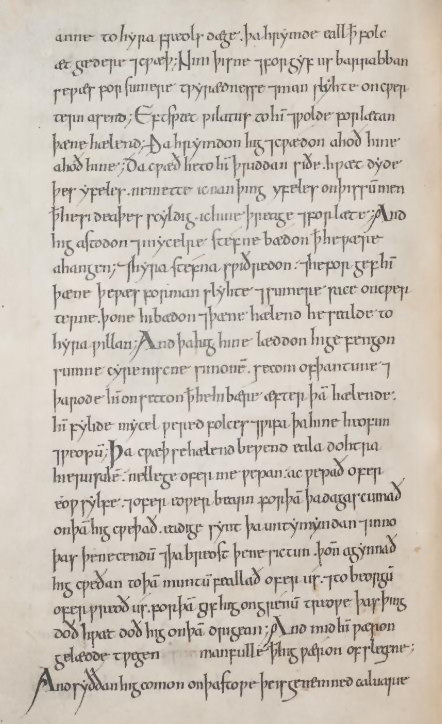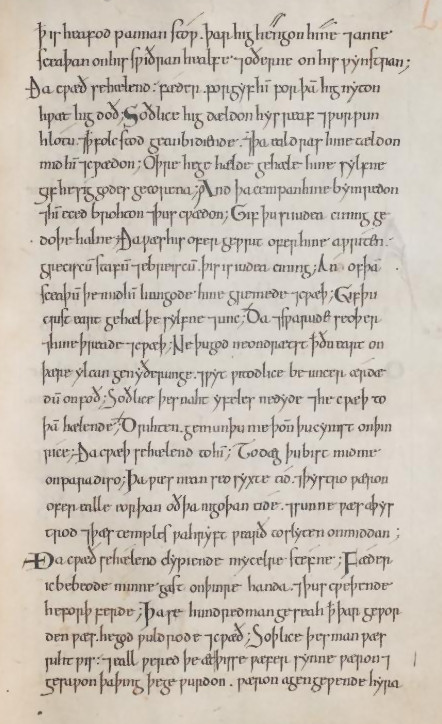Luke 23:18-48 from the “Bath” Manuscript
(Junicode font required)
 |
anne to hyra freols-dæge. 18 þa hrymde eall ꝥ folc æt-gædere ⁊ cƿæþ; Nim þisne ⁊ forgyf us barrabban 19 se ƿæs for sumere tƿyrædnesse ⁊ man-slyhte on cƿer tern asend; 20 Eft spæc pilatus to him ⁊ ƿolde for-lætan þæne hælend; 21 Ða hrymdon hig ⁊ cƿædon ahoð hine ahoð hine; 22 Ða cƿæð he to him þiddan siðe. hƿæt dyde þes yfeles. ne mette ic nan þing yfeles on þissum men ꝥ he si deaþes scyldig. ic hine þreage ⁊ forlæte; 23 And hig astodon ⁊ mycelre stëfne bædon ꝥ he ƿære ahangen; ⁊ hyra stëfna sƿiðredon. * 25 ⁊ he for-gef him þæne þe ƿæs for man-slyhte ⁊ sumere sace on cƿer terne. þone hi bædon ⁊ þæne hælend he sealde to hyra ƿillan; 26 And þa hig hine læddon hi gefengon sumne cyreniscne simonem. se com of þan tune ⁊ þa rode him on-setton ꝥ he hi bære æfter þam hælende. 27 him fylide mycel ƿered folces ⁊ ƿifa þa hine heofun ⁊ ƿeopun; 28 Þa cƿæþ se hælend beƿend eala dohtra hierusalem. nelle ge ofer me ƿepan. ac ƿepað ofer eoƿ sylfe. ⁊ ofer eoƿer bearn. 29 forðam þa dagas cumað on þam hig cƿeþað. eadige synt þa untymyndan ⁊ in-no þas þe ne cendun ⁊ þa breost þe ne sictun. 30 þonne agynnað hig cƿeðan to þam muntum feallað ofer üs. ⁊ to beorgum ofer-ƿreoð üs. 31 forþam gif hig on grënum treoƿe þas þing doð hƿæt doð hig on þam drigean; 32 And mid him ƿæron gelædde tƿegen manfulle ꝥ hig ƿæron ofslegene; 33 And syððan hig comon on þa stoƿe þe is genemned caluarie |
 |
ꝥ is heafod-pannan stöƿ. þar hig hine hengon ⁊ anne sceaþan on his sƿiðran healfe ⁊ oðerne on his ƿynstran; 34 Ða cƿæð se hælend. fæder. forgyf him forþam hig nyton hƿæt hig doð; Soðlice hig dældon hys reaf ⁊ ƿurpun hlötu. 35 ⁊ ꝥ folc stod geanbidiende. ⁊ þa ealdras hine tældon mid him ⁊ cƿædon; Oþre he ge-hælde gehæle hine sylfne gif he sïg godes gecorena; 36 And þa cempan hine by[s]mredon ⁊ him eced brohton 37 ⁊ þus cƿædon; Gif þu si iudea cining ge- do þe halne; 38 Ða ƿæs his ofer-geƿrit ofer hine aƿrïten. greciscum stafum ⁊ ebreiscum. þis is iudea cining; 39 Án of þam sceaþum þe mid him hangode hine gremede ⁊ cƿæþ; Gif þu crist eart gehæl þe sylfne ⁊ unc; 40 Ða ⁊ sƿarude se oþer ⁊ hine þreade ⁊ cƿæþ; Ne þu god ne ondrætst ꝥ ðu eart on þære ylcan genyðerunge. 41 ⁊ ƿyt ƿitodlice be uncer ærdæ- dum on-foð; Soðlice þes naht yfeles ne dyde 42 ⁊ he cƿæþ to þam hælende; Drihten. gemun þu me þonne þu cymst on þin rïce; 43 Ða cƿæþ se hælend to him; To-dæg þu bist mid me on paradiso; 44 Þa ƿæs nean seo syxte tïd. ⁊ þystro ƿæron ofer ealle eorþan oð þa nigoþan tïde. 45 ⁊ sunne ƿæs aþys- trod ⁊ þæs temples ƿahryft ƿearð toslyten on middan; 46 Ða cƿæð se hælend clypiende mycelre stëfne; Fæder ic bebeode minne gast on þinre handa. ⁊ þus cƿeþende he forþ-ferde; 47 Þa se hundred-man geseah ꝥ þar geƿor- den ƿæs. he god ƿuldrode ⁊ cƿæð; Soþlice þes man ƿæs riht-ƿis. 48 ⁊ eall ƿered þe æt þisse ƿæfer-synne ƿæron ⁊ gesaƿon þa þing þe ge-ƿurdon. ƿæron agen geƿende hyra |
| * verse 24 is omitted in the manuscript. In the Vulgate it reads, Et Pilatus adjudicavit fieri petitionem eorum. | |
